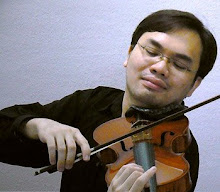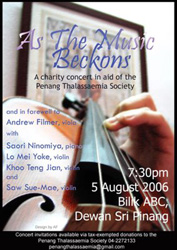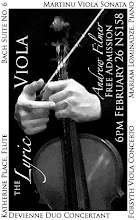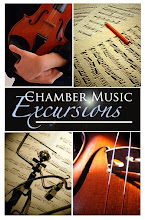This essentially started off as a comment of Teng Jian's blog - the first one on my list of links:
Anyway, it's a fairly short thought - I was just amused by how when Christian Rock pops up anywhere, my reaction is pretty much "Yechhh", despite not really having hear too much of it. And yet, I spend much time listening to the 17th Century equivalent, i.e. Bach chorales and similar stuff. What, it's better just because I don't understand the words? (But I do, cause they're in German, in the Lutheran style! ;)
But it either got too long or too long-winded that it ended up here. :P I've read it over, and it doesn't really have a clear train of thought, but then, that is very me.
Was studying theory and was surprised to note that for hundreds of years the Catholic Church basically was the main source of classical music - and the foundation for Western music in general. The Protestants deliberately changed the style of their compositions as a sign of their general intent, and this led to a sort of war of music between the composers of both faiths. Music was a serious sort of thing, and through most of music history it retained that sort of status - from the church to the concert hall. For the latter, people still considered a concert a formal event that was part of being cultured, a participant of the development of the arts and of society in general. That we in the classical music world - and I would say to some extent New Age as well, as contrasted to Christian rock - have that connection to the concert hall, we also have an umbillical chord to early church music.
In this connection, we basically don't consider chorales, motets, stabat maters and masses by Vivaldi, Bach and Mozart as religious music as much as they are classical music. Performances today seem to indicate this clearly, with all these pieces as regular parts of concert programs worldwide. Even at the time of composition, while they were written for some church purposes, there was no doubt a very strong social element to it. The post of Chapel Master was a strong social position and a influential musical position that could lead to other things. I wouldn't say those positions and roles were irregardless of the religion, but certainly with some independence of its own. In the same way that a Cardinal of the time was not only a leader of the faithful but a powerful political figure. I think that's just the way the Church was in those times, a collection of rather overlapping and undefined roles, that led to things happening the way they did.
Thus, perhaps the difference between listening to Bach and to Christian rock is not much really to do with the words or the religion but back to a more fundamental musical battle of classical versus modern music, namely, pop. And the cultures they portray and their basic attitude about the image of music. I should note that Christian rock really is much in the realm of pop than actual rock-and-roll, which was after all at one time ironically the "music of the devil". A discussion on that debate would take up who-knows-how-many additional posts. But I will say that Christian New Age like that of John Michael Talbot has more to offer on a musical level, and has some interesting chord progressions which are unique to the genre.
Part of it is that we perhaps question the intent of the music - for Christian music today (including gospel music) it comes to whether the performers do it as just a business, or more honestly as a form of evangelization. And if it is evangelization, is it just a comfortable "welcome, this is who we are" or a more intrusive and somewhat arrogant intent to convert?
For which again much can be written, but I'll state two points that I believe in:
1. Anyone trying to convert someone else to whatever belief should give as much time and openness in allowing that person to convert you - that's the only way it can be a philosophically fair playing ground.
2. Leading by example is the best form of evangelization - you don't need to carry around any tag or title, to emulate John Paul II's forgiveness of the person who shot him.
Subscribe to:
Post Comments (Atom)






2 comments:
Talbot.. .I've been recommended, but not heard it yet. And re chord progressions- I can't say I'm a big fan of church music chord progressions in general. Very soppy-cliched sounding... *shudder*
I like the classical chorals better. Pity thee Latin sung mass is dead.
As to the end, Interesting Point. Here; you know the song, I'm sure.
"I'm walking in Memphis
Walking with my feet ten feet off of Beale
Walking in Memphis
But do I really feel the way I feel
They've got catfish on the table
They've got gospel in the air
And Reverend Green be glad to see you
When you haven't got a prayer
But boy you've got a prayer in Memphis
Now Muriel plays piano
Every Friday at the Hollywood
And they brought me down to see her
And they asked me if I would --
Do a little number
And I sang with all my might
And she said --
"Tell me are you a Christian child?"
And I said "Ma'am I am tonight!"
And I'm walking in Memphis
Walking with my feet ten feet off of Beale
Walking in Memphis
But do I really feel the way I feel...."
Hmm... the song seems familiar, but very fuzzily so.
Talbot is somewhat unique in chord progressions compared to regular Christian rock, though I don't know how much that speaks for the whole genre of Christian New Age.
I hear in Australia, all cathedrals have weekly Latin masses.
Post a Comment